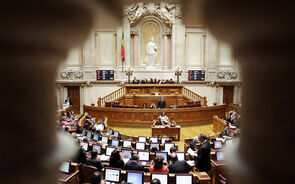Fundo Monetário Europeu
3 mensagens
|Página 1 de 1
União Europeia
Membro do BCE opõe-se ao Fundo Monetário Europeu
Cristina Barreto
08/03/10 18:10
O membro do Comité Executivo do BCE, Jürgen Stark, rejeitou hoje categoricamente a ideia de criação de um Fundo Monetário Europeu.
Em declarações que serão publicadas amanhã no jornal alemão Handelsblatt, Jürgen Stark, economista-chefe do Banco Central Europeu (BCE), sustenta que o dito fundo não seria compatível com a União Monetária, pois criaria um estímulo falso e prejudicaria os países com finanças públicas sólidas.
Na sua opinião, este instrumento "minaria a aceitação pública do euro e da União Europeia", avança o jornal espanhol "CincoDías".
O ministro das Finanças alemão, Wolfgang Schäuble, apresentou uma proposta, que está a ser analisada junto com a França, com vista à criação de um Fundo Monetário Europeu, com capacidade de actuação semelhante à do FMI, e com o objectivo de ajudar em situações como a da Grécia.
Esta ideia foi bem acolhida pela chanceler alemã Angela Merkel, embora esta defenda que têm de ser esclarecidos vários detalhes antes da sua aprovação.
Membro do BCE opõe-se ao Fundo Monetário Europeu
Cristina Barreto
08/03/10 18:10
O membro do Comité Executivo do BCE, Jürgen Stark, rejeitou hoje categoricamente a ideia de criação de um Fundo Monetário Europeu.
Em declarações que serão publicadas amanhã no jornal alemão Handelsblatt, Jürgen Stark, economista-chefe do Banco Central Europeu (BCE), sustenta que o dito fundo não seria compatível com a União Monetária, pois criaria um estímulo falso e prejudicaria os países com finanças públicas sólidas.
Na sua opinião, este instrumento "minaria a aceitação pública do euro e da União Europeia", avança o jornal espanhol "CincoDías".
O ministro das Finanças alemão, Wolfgang Schäuble, apresentou uma proposta, que está a ser analisada junto com a França, com vista à criação de um Fundo Monetário Europeu, com capacidade de actuação semelhante à do FMI, e com o objectivo de ajudar em situações como a da Grécia.
Esta ideia foi bem acolhida pela chanceler alemã Angela Merkel, embora esta defenda que têm de ser esclarecidos vários detalhes antes da sua aprovação.
Fundo Monetário Europeu
Em princípio parecer ser uma boa ideia para dar solidez e estabilidade ao Euro:
Finantial Times Escreveu:Brussels ready to back monetary fund
The European Commission on Monday signalled its willingness to swing into action with a plan for a monetary fund equipped with sufficient resources to assist highly indebted eurozone nations such as Greece.
Commission officials said preliminary work was already in progress and a proposal for a European Monetary Fund could be prepared by June, when EU heads of state and government are due to meet for a summit.
Antonio Tajani, the EU’s industry commissioner, said he and his colleagues were likely to have their first discussion of the plan at a regular weekly meeting of the Commission on Tuesday in Strasbourg.
The creation of a European Monetary Fund would mark a significant step forward in the integration of the eurozone economy, which for the past 11 years has had a single currency and a common central bank but has lacked a fiscal union and clear-cut arrangements for assisting a member-state in severe financial difficulty.
Officials cautioned that EU governments and the Commission were unlikely to agree on the structure of a monetary fund quickly enough for it to be of immediate use to Greece, which must refinance more than €20bn ($27bn) of debt in April and May.
It is also unclear how the Washington-based International Monetary Fund will react to the European proposals, since they would implicitly curtail the IMF’s role, next to the G20 group of leading industrialised and emerging economies, as one of the world’s most important institutions for handling financial emergencies.
Wolfgang Schäuble, Germany’s finance minister, said at the weekend that he imagined a European fund that would not compete with the IMF but would possess “comparable powers of intervention”.
Support for a European fund has come from Europe’s socialist parties, the second largest political group in the European parliament, which have proposed the creation of a “European mechanism for financial stability”, consisting of a trustee fund that would bring together the 16 eurozone governments and would be free to borrow on capital markets.
The socialists said their proposal would not involve “any transfer of funds from member-states to their partners” and would be intended merely “to ensure that speculative attacks on sovereign debts in the euro area will quickly become a thing of the past”.
All such initiatives are circumscribed to some extent by the terms of the EU’s Lisbon treaty, which came into effect in December and does not contain provisions for a radical advance to economic and fiscal union – although it does allow for enhanced economic policy co-operation.
The shape of the German proposal is dictated partly by the reluctance of political leaders, central bankers and the general public to bail out Greece, widely seen as responsible for its own troubles, and partly by the recognition that constitutional lawsuits could be launched in Germany against any attempt to provide financial aid to a fellow eurozone country.
However, diplomats predicted the German ideas might run into resistance elsewhere in the EU. Some countries would have misgivings about various punitive schemes that are under consideration in Berlin as accompaniments to a European monetary fund.
One idea is the suspension of EU subsidies, known as cohesion funds, to countries that fail to observe fiscal discipline. These multibillion-euro programmes have played a large part over the past 20 years in raising living standards in less affluent member-states, such as Greece, Ireland, Spain and the former communist countries of central and eastern Europe.
Enforcement of stricter fiscal discipline in return for the establishment of a European monetary fund would risk running into other political obstacles. Although the EU’s stability and growth pact – the eurozone’s fiscal rulebook – already permits a country to be fined for persistent mismanagement of the public finances, governments have in practice avoided imposing such a punishment on one of their number for fear that the tables might one day be turned on themselves.
Another potential hitch lies in the different perceptions of eurozone countries about what constitute the main structural weaknesses of European monetary union. France and others take the view that the problems lie partly in the imbalances between states such as Germany, which are running large current account surpluses, and less competitive nations such as Greece and Portugal, which are burdened with deficits. However, German politicians and business people see their surpluses as a sign of Germany’s competitive strength.
As pessoas são tão ingénuas e tão agarradas aos seus interesses imediatos que um vigarista hábil consegue sempre que um grande número delas se deixe enganar.
Niccolò Machiavelli
http://www.facebook.com/atomez
Niccolò Machiavelli
http://www.facebook.com/atomez
3 mensagens
|Página 1 de 1


